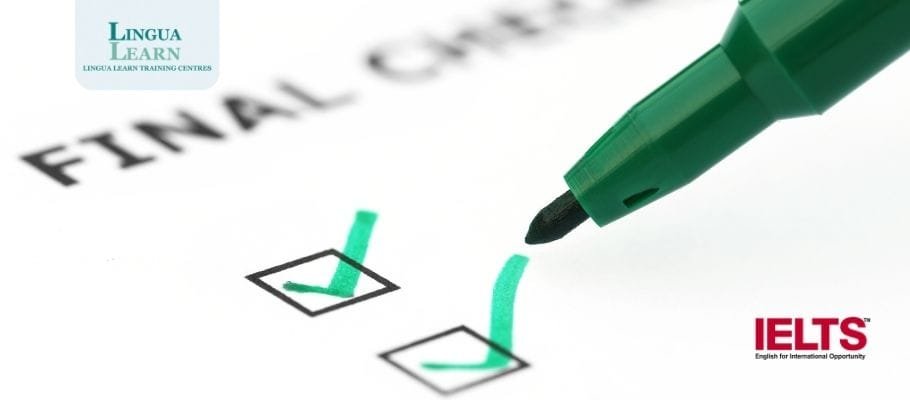1. Review, Don’t Cram
إن day before IELTS exam is not the time for late-night cramming. Instead, review lightly. Go over your notes, skim through common essay formats, or read a short practice passage. Spending too many hours studying today could actually leave you more tired and less focused tomorrow. Trust your preparation — you’ve done the work.
2. Get Your Documents and Essentials Ready
The last thing you want is a stressful morning searching for your passport or ID. The day before IELTS exam, double-check your essentials:
- Valid passport or government ID (as required)
- IELTS confirmation letter or test receipt
- Stationery allowed by the center
- A transparent water bottle (check the rules)
Check the official requirements on IELTS.org so you’re fully compliant with test-day regulations.
3. Plan Your Route to the Test Center
Nothing raises stress levels like being late. The day before IELTS exam, map out your journey. How long will it take with traffic? Do you need public transportation tickets? Arriving 30 minutes early gives you time to settle in calmly.
4. Prioritize Sleep and Rest
Sleep is often underestimated. The day before IELTS exam, aim for at least 7–8 hours of quality rest. Studies from the American Psychological Association confirm that sleep improves memory and reduces anxiety. Avoid caffeine after mid-afternoon and stick to your normal bedtime routine.
5. Eat Smart for Energy
What you eat the day before IELTS exam has a direct effect on your focus and stamina. Eat balanced meals — lean protein, vegetables, and whole grains. Avoid greasy fast food or too much sugar. On the morning of the test, a light breakfast such as eggs, oats, or fruit will give you lasting energy without making you feel heavy.
6. Practice Relaxation Techniques
It’s natural to feel nervous the day before IELTS exam. Use deep breathing, meditation, or light exercise to calm your body and mind. A 15-minute walk outside can clear your head. Some candidates also find mindfulness apps helpful for lowering anxiety before big events.
7. Pack and Prepare the Night Before
The night before IELTS exam, set out your clothes, bag, and documents. Decide what you’ll eat for breakfast. Charge your phone. Small preparations today prevent unnecessary stress tomorrow. Think of it like preparing for a flight — you don’t want to rush through security at the last second.
8. Lightly Test Your Skills (Optional)
If doing a short exercise boosts your confidence, try a 10–15 minute review session. For example, practice outlining an essay or reading one passage. The key is to keep it short — don’t exhaust yourself the day before IELTS exam. Your goal is to warm up, not burn out.
9. Avoid Negative Triggers
Scrolling through forums or comparing scores with friends can create unnecessary stress. The day before IELTS exam, protect your focus. Stay away from anything that makes you second-guess yourself. Trust that your preparation has been enough.
10. Visualize Success
Visualization is a powerful mental tool. The night before IELTS exam, imagine yourself arriving calmly at the test center, listening attentively during the listening test, writing essays with clarity, and leaving with confidence. Positive mental rehearsal reduces anxiety and builds self-belief.
Bonus Tip: Stay Hydrated and Balanced

الإرشادات
Often overlooked, hydration is key. Drink water throughout the day before IELTS exam. Avoid too much coffee or energy drinks, which may affect your sleep or increase anxiety. Balance is the secret to performing well under pressure.
الأفكار النهائية
إن day before IELTS exam is about strategy, not study marathons. By following this checklist, you’ll create the best conditions for success — mentally sharp, physically energized, and emotionally calm. Your preparation has brought you this far, and now it’s time to trust yourself.
Continue Your IELTS Journey with Lingua Learn
If you’re preparing for IELTS and want expert guidance, check out Lingua Learn’s IELTS preparation courses. Whether you’re fine-tuning your skills or just starting your IELTS journey, our tutors help you achieve the score you need.
You can also explore Lingua Learn for more language-learning opportunities, tailored courses, and study resources to support your academic or career goals.

